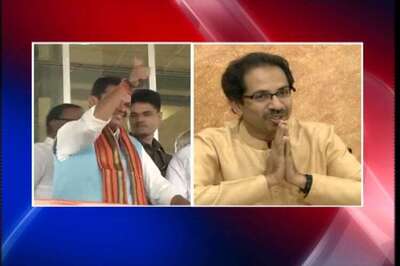
views
After being success in Karnataka, home voting facility will also be provided in the upcoming assembly elections in five states – Rajasthan, Chhattisgarh, Madhya Pradesh, Telangana and Mizoram, which will ease the process for more than 42 lakh voters (above the age of 80 years or persons with disability).
The ‘Absentee Voter’ as per the clause (aa) of Rule-27A of the Conduct of Elections Rules, 1961 are employed in essential services, senior citizens over 80 years, and persons with disability and Covid-19 suspects or affected persons who have the optional facility of postal ballot.
According to the data from the Election Commission (EC), more than 42 lakh voters in the five states are either above the age of 80 years or are persons with disability (PwD). At least 32,410 voters are above the age of 100 years in the five states. Further, 17.34 lakh voters are in the PwD category while 24.7 lakh are those above the age of 80 years.

The EC on Monday announced the schedule for the upcoming Legislative Assembly elections in Chhattisgarh, Madhya Pradesh, Mizoram, Rajasthan and Telangana.
The polling in five states will start from November 7 with Chhattisgarh and Mizoram. While Mizoram will have single-phase polling, Chhattisgarh will see voting in two times on November 17 as well. Madhya Pradesh will go to polls on November 17, while single-phase elections will take place in Rajasthan and Telangana on November 23 and 30, respectively.
Among these states, Rajasthan has the highest share of PwD (5.60 lakh), voters above 80 years (11.78 lakh) and centenarian citizens (17,241).
Telangana has 5.06 lakh PwD, 4.44 lakh above 80 years and more than 7,000 centenarian voters. In MP, there are 5.05 lakh PwD, 6.53 lakh over 80 years and 5,124 centenarian voters.
Chhattisgarh has more than 1.6 lakh PwD, 1.86 lakh who are over 80 years of age and 2,462 centenarian voters. In Mizoram, the number of PwD voters stood at 3,243. While those above 80 years of age are 8,500 and above 100 years are 578 in numbers.
Why Home Voting?
During the Bihar assembly elections in 2020 amidst the coronavirus pandemic, the idea of ballot voting for a section of voters was introduced. This continued for other states as well that went for polls in early 2021 when the virus was spreading. It was also carried out in Gujarat elections in December 2022.
This not only eases the voting process for these groups but also ensures their participation in the elections.
During the Karnataka assembly elections in May, the turnout in the 80+ group stood at around 95% with 75,690 voted from their home. In case of PwD voters, the turnout was around 97%.
How Does Home Voting Work?
Firstly, these voters, who wish to cast the vote through ballot, have to make an application to the Returning Officer (RO) of the constituency concerned, in Form-12D. This application should be submitted within five days following the date of notification of the elections.
BLOs have the duty to visit the houses of the absentee voters and deliver Form 12D. If these voters wish to opt for ballot, then the BLO will collect the filled-in-Form 12D and deposit it with the RO.
It is also important to note that this facility is optional and does not involve any postal department for mailing arrangement. Rather, a polling team including two polling officials along with a videographer and security will go to the elector’s house with a voting compartment and get the elector to vote on the postal ballot maintaining complete secrecy of vote.
To ensure transparency, the list of all these voters opting for home voting is shared with the contesting candidates of recognised political parties in printed hardcopy.
Not just a list but the candidates are also given the schedule of voting and the route chart of the polling parties so that they can send their representatives to witness the polling procedure.
After the voting, the ballots are stored securely with the RO. Counting of these votes are done with other votes.
On Monday, while announcing the poll dates, Chief Election Commissioner Rajiv Kumar said the poll body has directed the Chief Electoral Officers of Chhattisgarh, Madhya Pradesh, Mizoram, Rajasthan and Telangana to take necessary steps for the dissemination of information and extending facilitation to the above categories of voters.















Comments
0 comment